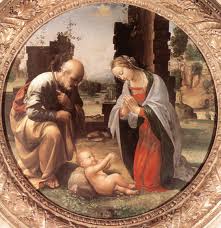
In Luke’s gospel, the archangel Gabriel appears to the Virgin Mary with the annunciation that she is to be the mother of God’s Son. In Matthew’s gospel, it is St. Joseph who is the recipient of such Good News. Our Lady responds with her unreserved ‘yes’. St. Joseph, on the other hand, says nothing; instead he simply ‘did as the angel of the Lord commanded him’ (Mt 1:24). In his Apostolic Exhortation Redemptoris Custos (‘Guardian of the Redeemer’) on the life of St. Joseph, Pope John Paul II noted that “this first ‘doing’ became the beginning of ‘Joseph’s way’. The Gospels do not record any word ever spoken by Joseph. But the silence of Joseph has its own special eloquence” (n. 17). St. Joseph was a man of great faith, not speaking his own words, but listening to the word of the Living God. He listens in silence, and is ready to put into action the word he hears.
St. Joseph proved himself a just man in the silence of his relationship with Mary. At the time of the Annunciation, they were betrothed, but were as yet not living together. Their union had not been consummated by sexual union since it is stressed that Mary was a virgin. With this in mind, the news of her pregnancy is unsettling for St. Joseph. Using his own logic he could only assume that she had been unfaithful to him. And yet he does not react with righteous anger, pointing the finger, or the need to defend his reputation. Instead, we are told that “Joseph, being a just man and unwilling to put her to shame, resolved to send her away quietly” (Mt 1:19).
He was resolved to carry out this plan when he was visited by the angel in a dream who reassured him of the divine origins of Mary’s unborn child. St. Joseph’s response to the angel’s intervention was one of obedient openness to the will of God. Although he could hardly have conceived the magnitude of the mystery that confronted him, “he did as the angel of the Lord commanded him and took Mary as his wife” (Mt 1:24). “He took her in all the mystery of her motherhood,” wrote John Paul. “He took her together with the Son who had come into the world by the power of the Holy Spirit. In this way he showed a readiness of will like Mary’s with regard to what God asked of him through the angel” (ibid., n. 3).
St. Joseph also took the Virgin Mary as his wife in the knowledge that she had consecrated herself to the Lord. “From the moment of the Annunciation, Mary knew that she was to fulfil her virginal desire to give herself exclusively and fully to God precisely by becoming the Mother of God’s Son” (ibid., n. 18). This is not the usual way of marriages. Sexual intimacy is a natural and integral part of the marriage union. To get around the ‘unnaturalness’ of Joseph and Mary’s marriage, it has often been suggested that St. Joseph was an old man, whose union with the Blessed Virgin was therefore more like a guardian than a husband. However, I don’t think that such an explanation is necessary. Indeed, it somehow diminishes St. Joseph’s virtue, and neglects the power of God’s Spirit active in his life. John Paul wrote: “Joseph, in obedience to the Spirit, found in the Spirit the source of love, the conjugal love which he experienced as a man. And this love proved to be greater than this ‘just man’ could ever have experienced within the limits of his human heart” (ibid., n. 19). His need for human love and intimacy was not nullified, but was supplied by God’s Spirit working in his life.
It is the same for those of us who profess a vow of celibate chastity. We do not profess chastity because sex is bad. Rather, a life of consecrated chastity acts as “a witness to the power of God’s love manifested in the weakness of the human condition” (Vita Consecrata, n. 88). Like St. Joseph, who in his chaste union with the Virgin Mary experienced a love greater than he could ever have imagined within the limits of his human heart, the consecrated person attests “that what many have believed impossible becomes, with the Lord’s grace, possible and truly liberating. Yes, in Christ it is possible to love God with all one’s heart, putting him above every other love, and thus to love every creature with the freedom of God!” (ibid.). John Paul adds that “this testimony is more necessary than ever today, precisely because it is so little understood by our world. It is offered to everyone – young people, engaged couples, husbands and wives and Christian families – in order to show that the power of God’s love can accomplish great things precisely within the context of human love. It is a witness which also meets a growing need for interior honesty in human relationships” (ibid.).
St. Joseph is therefore a timeless example for us to contemplate. The virtues that he witnessed to – his faithfulness, integrity and chastity – are qualities not much esteemed in our contemporary society. But for us, as men and women who are conformed to Christ, they are necessary virtues. By nurturing these values in our lives, we too, like St. Joseph, act as silent witnesses to the world. Being open to the action of God’s grace in our lives, we too, like him, will be just in our way of living.
St. Joseph, pray for us!



